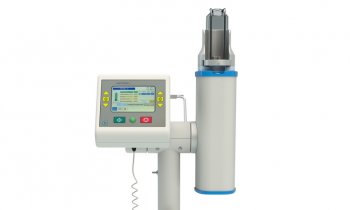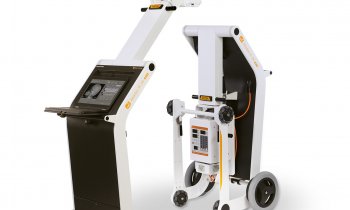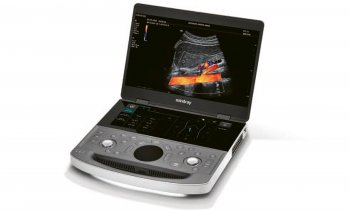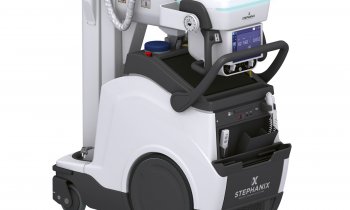
Image source: Adobe Stock/pathdoc
News • Diagnosis with smartphone recording
Covid-19 severity analysis via cough sound
A research team led by the Institute for Bioengineering of Catalonia (IBEC) and Hospital del Mar has conducted a study to analyze cough sounds recorded by smartphones in patients with Covid-19.
The results, published in European Respiratory Journal Open Research, reveal cough characteristics that could offer a quick, easy, and cost-effective method for identifying the severity of the disease in patients, whether at home or in any healthcare setting. This work also paves the way for utilizing this model in the ongoing monitoring of patients with persistent Covid-19 and other respiratory pathologies.
While most individuals impacted by Covid-19 experience milder symptoms and recover within a few weeks, the global pandemic caused by the Sars-CoV-2 virus continues to pose a significant health challenge. Some of those affected may progress to develop more severe illness and pneumonia, often resulting in a more unfavorable prognosis.
Although protocols have been developed to assess patients’ risk, diagnostic and prognostic tools primarily rely on expensive and less accessible imaging methods, such as radiography, ultrasound, or computed tomography (CT). Therefore, there is a need to develop a simpler and more readily available prognostic tool that enables healthcare providers to identify patients who have developed or are at risk of developing severe disease. This would streamline patient triage and facilitate early intervention, even in home or primary care settings.
Now, a research team led by IBEC and Hospital del Mar, with collaboration from the Universitat Politècnica de Catalunya (UPC), CIBER-BBN and CIBERES, has carried out a study based on the analysis and interpretation of cough sounds in the initial phases of Covid-19. This method is presented as a potential predictive, simple, and accessible tool to assess the risk of suffering severe pneumonia.
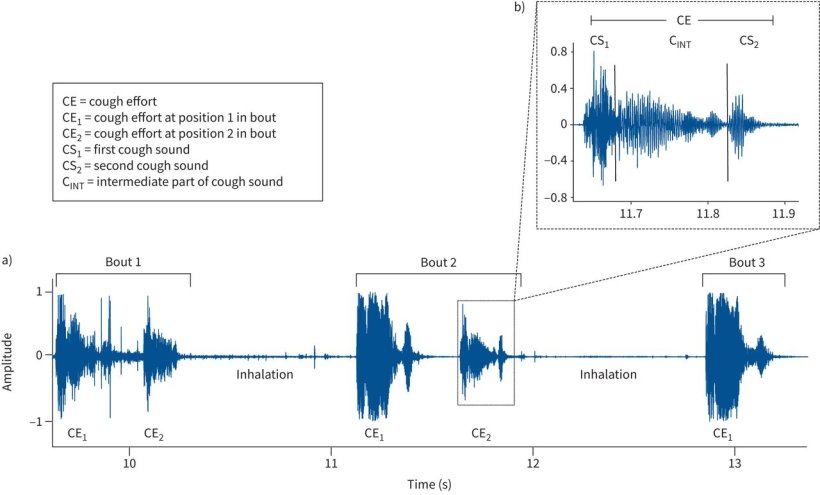
Image source: Davidson et al., ERJ Open Research 2023 (CC BY-NC 4.0)
The research involved smartphone recordings of voluntary coughing sounds from 70 patients with Sars-CoV-2 infection, all recorded within the first 24 hours after their admission to the hospital. IBEC conducted an acoustic analysis of these recordings, which revealed significant differences in cough sounds depending on the severity of the respiratory condition, as previously confirmed by imaging tests and the need for supplemental oxygen. The results indicate that this analysis could be used to categorize Covid-19 patients as mild, moderate, or severe and to monitor patients with persistent Covid-19. The study was conducted using data collected between April 2020 and May 2021 at Hospital del Mar.
Raimon Jané, a professor at UPC and the principal investigator at IBEC and CIBER-BBN, leads the Biomedical Signal Processing and Interpretation (BIOSPIN) group at IBEC. This group has developed the methodology and algorithms for the acoustic analysis of cough signals collected via smartphones. Using a statistical model known as a linear mixed model, the team identified five parameters, based on sound frequencies, that exhibited significant differences in the coughs of patients with varying levels of disease severity and pneumonia progression. These differences may reflect the progressive respiratory system alterations in patients with Covid-19.
This approach can aid in the prompt identification and isolation of Covid-19 patients, thus facilitating proper medical care and the implementation of control measures
Joaquim Gea
The authors of the study explain that cough analysis can serve a dual purpose: early detection of severe Covid-19 cases and remote monitoring of their progression, including the assessment of potential complications. However, further research involving a larger patient sample will be required to validate the findings of this cross-sectional study, which could pave the way for utilizing cough analysis as a diagnostic tool for patients with Covid-19 and other respiratory diseases.
For this reason, Dr. Joaquim Gea, emeritus head of the Pneumology Service, researcher at the Hospital del Mar Research Institute, and senior co-author of the study, suggests that these findings can prove beneficial “in regions with limited medical infrastructure or during emergency situations. This approach can aid in the prompt identification and isolation of Covid-19 patients, thus facilitating proper medical care and the implementation of control measures.”
Another noteworthy aspect is that, while the study primarily centered on Covid-19, it paves the way for applying this model to other respiratory conditions.
Source: Institute for Bioengineering of Catalonia
25.09.2023






